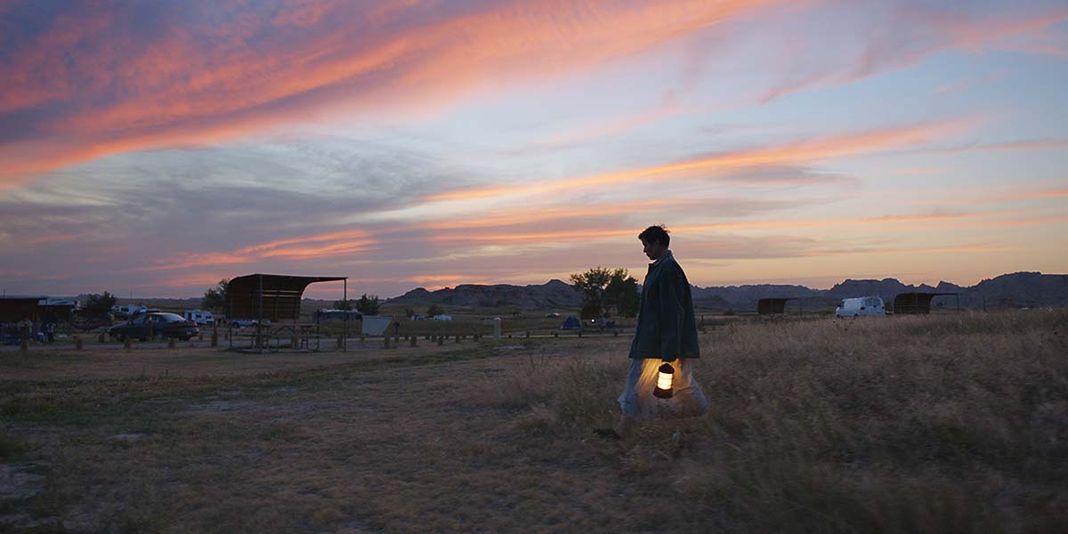The themes and troubles that drive Chloé Zhao’s Nomadland could be from anywhere. Everywhere there are people with too much sorrow and not enough money; everywhere restless souls strike out to see the world; everywhere bonds are forged and broken and maybe forged again somewhere down the road.
But the specific combination in which they appear here, catalyzed by indifferent government policies and set against endless desert skies, feel unmistakably American. This may not be a story that could only ever happen in America, but it’s a story that speaks to both the promise and the lie of a uniquely American mythos.
Based on Jessica Bruder’s nonfiction 2017 tome Nomadland: Surviving America in the Twenty-First Century, the film follows Fern (Frances McDormand), who’s spent much of her life living with her husband in a small company town. By the time we meet her in 2011, however, he has died and so has the town. With little else to either anchor her or keep her afloat, she hits the road in search of work, connection, and perhaps adventure. She’s houseless but not homeless, as she tells a concerned friend; her van is her home.
Nomadland speaks to both the promise and the lie of a uniquely American mythos.
Fern crisscrosses the country working odd jobs: packing boxes for Amazon, mopping floors in an RV park bathroom, flipping burgers at the Wall Drug tourist stop. In doing so, she joins a larger community of nomads, mainly older people like her looking for work. Most of her new friendships trail off when one party or the other hits the road again, but a few keep recurring, like the kindly gentleman (David Strathairn) with an understated but obvious crush on her.
McDormand and Strathairn are the only name actors in the entirety of Nomadland — or, for that matter, in Zhao’s filmography so far. (That will change drastically in 2021 with Eternals, Zhao’s star-studded Marvel movie.) Much of the rest of the cast consists of real-life nomads, and Zhao treats them with every bit as much curiosity and tenderness as she does her famous lead. McDormand, for her part, is brilliant as Fern, gritty enough to blend in but magnetic enough to shoulder the film’s gentle emotional arcs with grace.
Through their stories as well as Fern’s, we become familiar with the combination of choice and necessity that have landed these people here. Unsurprisingly, economic anxiety is a major theme. In one scene, Fern’s friend explains that she turned to the nomad lifestyle after working all her life only to discover that her Social Security retirement benefits amount to peanuts. When Bob Wall (a well-known real-life nomad) rails against “the tyranny of the dollar” a few scenes later, describing the ideal American worker as “a workhorse willing to work itself to death and then be put out to pasture,” it’s impossible to argue.

Image: TIFF
But Nomadland is no stump-speech anecdote or soapbox sermon. It’s too empathetic for that, too invested in the humanity of Fern and all those around her. The film does not shy away from the harder details of Fern’s life — the physical toll that manual labor takes on Fern, the danger she faces if her car should break down, even the awkwardness of having to poop into a bucket. At the same time, it savors moments of joy, like the smile that cracks her face wide open when she’s sharing a joke with a new friend, or the blissful calm that melts over her whole body when she goes skinny-dipping in a stream. Particularly at a time when so many of us are stuck at home alone, Nomadland might be enough to make you yearn to hit the open road yourself, and get lost in the wilderness so you can be found again.
Nomadland itself is almost plotless, in the sense that there are few dramatic plot twists or even ostentatious displays of emotion. You may find yourself moved to tears or to ecstasy by the poetry of its images, but the characters themselves tend to take their pains and pleasures in stride. Yet contained within it are several different stories we know by heart already.
There’s the one about the pioneer venturing out into the American West to seek her fortune, find herself, and explore new territories. And the one about the restorative power of the wild, the connection to nature that makes the entire world feel like home. Nomadland is a tribute to the spirit of independence that keeps a woman pressing onward even as life keeps knocking her down, and the resilience of the community that helps her back up each time, and also an indictment of the system that keeps pushing them back down again.
Above and beyond all that, though, Nomadland is simply the story of Fern. Maybe you’ve met someone like her. More likely you haven’t; Fern is part of a community that’s been relegated to the sidelines by a society that’s deemed them too old, too poor, too eccentric, too something to be worth caring about. But Nomadland pays her the attention she deserves. It asks us to see her, to know her, to love her, and ultimately, recognize her as one of us.
Nomadland is now screening at the Toronto International Film Festival. It is scheduled to hit theaters Dec. 4.
